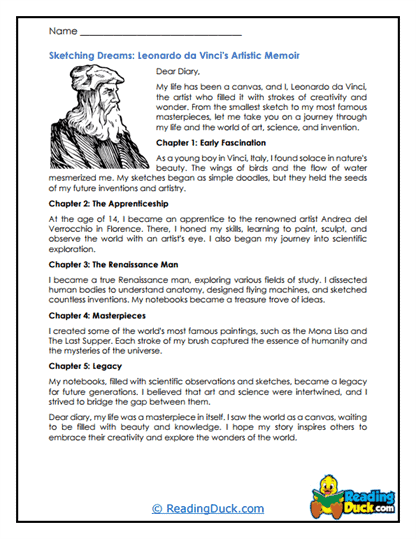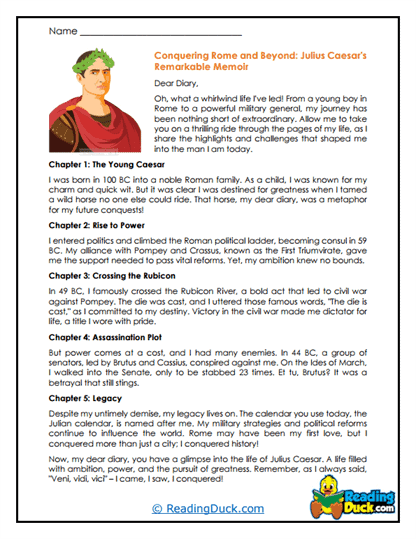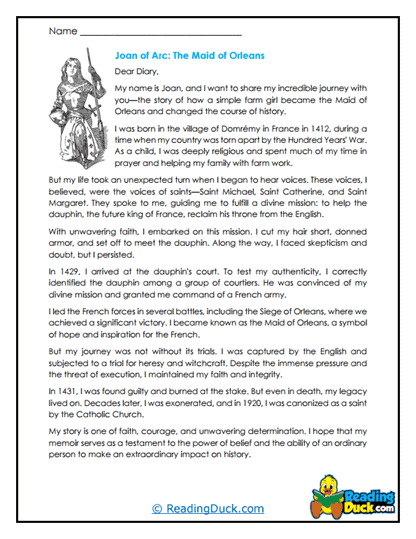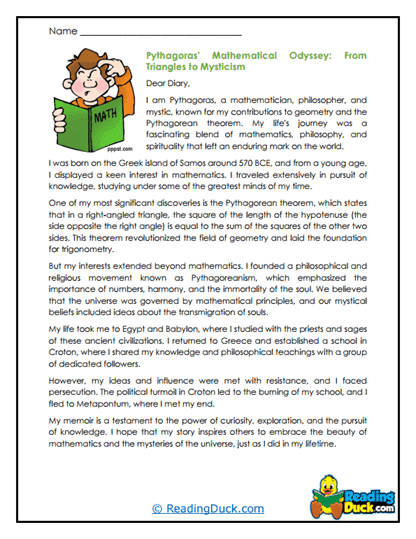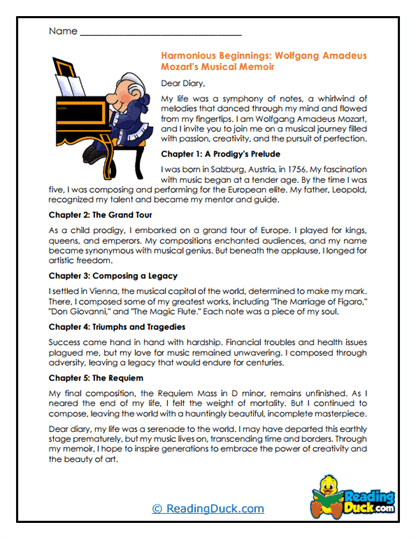Memoir Passages Worksheets
About Our Memoir Passages Worksheets
Our Memoir Passages Worksheets offer students a unique opportunity to explore personal narratives within the realm of nonfiction. These worksheets are thoughtfully designed to engage students in understanding the essence of memoir writing, with each worksheet set including a memoir-based reading passage accompanied by multiple-choice questions, short answer prompts, and open-ended response tasks. This structure allows students to delve deeper into the themes, emotions, and experiences that define the memoir genre.
Presented in PDF format for ease of access, the worksheets are straightforward to view, download, and print, making them a flexible resource for classroom and independent study. Each worksheet comes with a downloadable answer key, providing teachers with the tools for efficient assessment and immediate feedback. Through these exercises, students will enhance their reading comprehension, critical thinking, and creative expression, while gaining insight into real-world stories and personal growth.
Exploring the Memoir Genre
Memoirs are a significant subgenre of nonfiction, focusing on the author's personal experiences and reflections. Unlike autobiographies, which chronologically cover the author’s life, memoirs emphasize pivotal moments, emotions, and themes that hold deep meaning for the writer. Memoirs allow students to explore intimate, often transformative life experiences, offering an authentic and emotional way to understand human complexity.
The memoir genre touches on themes of identity, memory, and growth, making it a valuable tool for helping students understand how personal narratives shape broader cultural, historical, and societal contexts. Through reading memoirs, students learn to connect with the emotional aspects of real-world issues, whether it’s grappling with overcoming adversity, celebrating triumphs, or reflecting on personal growth. Memoir writing provides a window into self-reflection and vulnerability, which can help students develop empathy and emotional intelligence as they navigate the intricacies of the human experience.
The Memoir Passages Worksheets expose students to a wide variety of memoirs, from renowned figures to everyday individuals, allowing them to explore different perspectives and voices. Through the structured questions provided in each worksheet, students learn to extract the deeper meanings behind the author’s words, identify literary techniques, and explore the impact of storytelling on both the writer and the reader.
Enhancing Nonfiction Literacy Skills
Our Memoir Passages Worksheets are designed to support the development of genre-specific skills, empowering students to better understand and engage with nonfiction texts. These worksheets offer structured exercises that guide students through various reading and writing tasks, honing essential skills such as:
- Reading comprehension: By analyzing memoir passages, students practice identifying key details, understanding the author’s intent, and connecting personal stories to larger themes.
- Critical thinking: Memoirs often present nuanced reflections on life events, requiring students to engage in deeper thought about the text’s meaning, the author’s motivations, and the broader context.
- Creative expression: Through open-ended response questions, students have the opportunity to reflect on their own lives, drawing parallels between the memoir they’ve read and their personal experiences.
For example, a passage about overcoming challenges might prompt students to write their own reflections on resilience, thereby linking the memoir genre to their creative writing development. Multiple-choice questions test reading accuracy, while short answer prompts encourage deeper exploration of literary elements, such as symbolism, voice, and point of view.
Supporting English Language Learners (ELL) Through Memoirs
Memoirs, with their focus on personal experience and accessible narrative styles, offer a valuable resource for English Language Learners (ELL). The Memoir Passages Worksheets can be easily adapted to support ELL students at various stages of language acquisition. Here are several ways they provide targeted assistance:
- Vocabulary building: Memoirs often include rich, descriptive language that introduces students to new words. The worksheets provide opportunities to explore this vocabulary in context, helping ELL students expand their linguistic knowledge.
- Comprehension scaffolding: Memoirs’ narrative nature makes them inherently engaging for ELL students, as they can more easily connect to the personal and emotional aspects of the text. The worksheets help guide ELL students through comprehension by breaking down complex ideas into manageable tasks.
- Genre-specific language: The memoir genre introduces students to unique storytelling techniques and reflective writing styles. By engaging with these passages, ELL students learn new ways of expressing personal thoughts and emotions, further enhancing their language proficiency.
Teachers can provide additional support through the downloadable answer keys, which enable them to offer clear feedback and explanations, ensuring ELL students fully grasp the nuances of the text.
Building Cross-Disciplinary Skills
Memoir writing often intersects with other academic disciplines, making these worksheets an ideal tool for fostering cross-disciplinary learning. The reflective nature of memoirs allows students to engage with topics that link directly to subjects such as history, social studies, and even science. For instance:
- History: Memoirs based on significant historical events, such as wartime experiences or civil rights movements, offer students a firsthand perspective on historical moments, bringing classroom lessons to life.
- Social studies: Through memoirs, students explore societal issues such as immigration, poverty, or racial identity, learning about different cultural and social perspectives in a personal and relatable way.
- Science: Personal narratives around medical conditions, environmental experiences, or scientific discovery provide a human perspective on scientific topics, allowing students to connect academic concepts to real-world experiences.
These Memoir Passages Worksheets provide an integrated learning experience, helping students make connections between the personal stories they read and the broader academic themes they study in other subjects.
Strengthening Literacy Programs with Memoir Worksheets
The Memoir Passages Worksheets can be seamlessly integrated into broader literacy programs, helping students develop essential reading and writing skills that are central to success in academic and everyday life. These worksheets not only focus on comprehension but also encourage students to engage critically with the text. By incorporating memoirs into literacy programs, educators can:
- Foster critical reading skills: Students learn to analyze how authors use structure, tone, and voice to convey personal experiences, teaching them to read beyond the surface level and engage with deeper meanings.
- Develop well-informed responses: The open-ended response questions encourage students to use textual evidence to support their interpretations and personal reflections, building skills in text-based analysis and argumentation.
- Encourage personal reflection and engagement: Memoirs often resonate with students on an emotional level, making them an excellent tool for motivating reluctant readers or writers. The connection between personal experiences and written expression is a powerful way to enhance literacy.
Memoirs can be particularly effective in helping students develop a growth mindset, as they read about how individuals confront challenges, overcome obstacles, and reflect on their journeys.
Encouraging Personal Reflection and Insight
One of the most powerful aspects of memoirs is their ability to inspire personal reflection. Our Memoir Passages Worksheets include questions that invite students to make connections between the text and their own lives. By reflecting on the experiences and emotions presented in the memoirs, students gain a deeper understanding of themselves and the world around them. These reflective questions serve several purposes:
- Promoting personal connections: Memoirs allow students to see parts of their own lives mirrored in the experiences of others, encouraging them to think about their own growth, challenges, and triumphs.
- Fostering independent thought: The open-ended nature of reflective questions allows students to form their own interpretations, encouraging independent thinking and a deeper engagement with the text.
- Encouraging empathetic thinking: Memoirs offer windows into the lives of others, helping students develop empathy by understanding diverse experiences, perspectives, and cultures.
Through these reflective exercises, students not only enhance their understanding of the memoir genre but also develop skills that are essential for social-emotional learning.
Conclusion
Our Memoir Passages Worksheets provide a rich and versatile tool for exploring one of the most engaging and reflective forms of nonfiction. By guiding students through the analysis of personal narratives, these worksheets help foster a deeper connection with the material, while developing essential skills in reading comprehension, critical thinking, and personal expression. Adaptable for English Language Learners and supportive of cross-disciplinary learning, the memoir worksheets offer a holistic approach to education that links academic skills with personal growth.
With their inclusion in broader literacy programs, these worksheets offer students a valuable resource for enhancing their ability to read critically, analyze nonfiction texts, and construct thoughtful, well-informed responses. The reflective and opinion-based questions allow students to connect more deeply with the material, making memoirs not only a powerful tool for academic learning but also for personal development.

